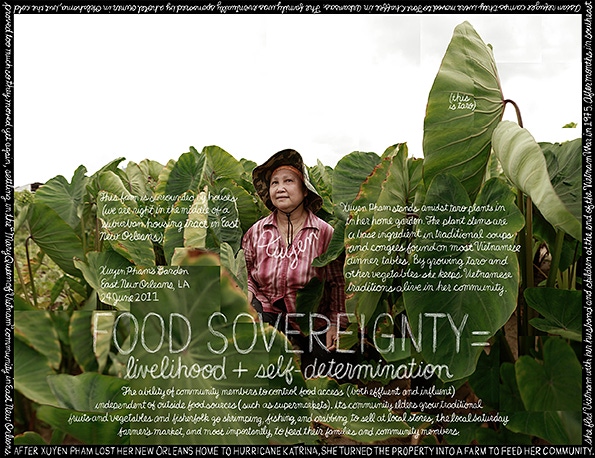Watchword: Food Sovereignty
To draw attention to the best and brightest ideas in sustainability, the Lexicon of Sustainability's Food List project defines the words that are integral to a healthy, transparent, and accountable food system. Each week, we explore a new word through artwork, films, recipes, and written works.See all Food List words here.
January 21, 2015

Food Sovereignty: When people around the world fight to have a say in their own food system, they are fighting for their right to food sovereignty.
“Food security means knowing where your next meal comes from," explains Raj Patel, author of The Value of Nothing. "Food sovereignty is a much deeper idea about having the power to decide how you and your community will shape your food system. It involves people holding meetings to figure out how water is shared, how food is shared, and how hunger is eradicated. It’s a food system where kids learn from school how and where their food comes from. It is a food system that is free of the subsidy and free of the marketing that agriculture is allowed to employ on our children, but it is most of all characterized by it’s conversations around how to end hunger and poverty. Those kinds of conversations are ones that are happening now.”

Title: Food Sovereignty
Location: Xuyen Pham’s Garden, East New Orleans, LA
Featuring: Xuyem Pham
Xuyen Pham (pictured above) fled Vietnam with her husband and children at the end of the Vietnam War in 1975. After months in Southeast Asian refugee camps, they moved to Fort Chaffee in Arkansas. The family was eventually sponsored by a hotel owner in Oklahoma. They moved again, settling in the “Mary Queen of Vietnam”, a community in East New Orleans.
Thirty years later, after Xuyen lost her New Orleans home again, this time to Hurricane Katrina in 2005, she turned the property into a farm to feed her community. Xuyen’s farm is right in the middle of a suburban housing track in East New Orleans. Here, she stands amidst taro plants in in her home garden. The plant stems are a base ingredient in traditional soups and congees found on most Vietnamese dinner tables. By growing taro and other vegetables she keeps Vietnamese traditions alive in her community.
For Xuyen, food sovereignty requires both livelihood and self-determination. It’s the ability of community members to control food access independently of outside food sources. It’s community elders grow traditional fruits and vegetables and fisher folk go shrimping, fishing, and crabbing to sell at local stores, the local Saturday farmer’s market, and most importantly, to feed their families and community members.
The principles of food sovereignty
 Communities all over the world are embracing food sovereignty as a means to fixing our broken global food system. As a movement, small farmers, fishers, consumers, environmentalists, and indigenous groups work together to preserve agricultural heritage and alleviate the stresses imposed on them by the global food market.
Communities all over the world are embracing food sovereignty as a means to fixing our broken global food system. As a movement, small farmers, fishers, consumers, environmentalists, and indigenous groups work together to preserve agricultural heritage and alleviate the stresses imposed on them by the global food market.
The Principles of Food Sovereignty call for:
1. Food for People
2. Valuing Food Providers
3. Localizing Food Systems
4. Making Decisions Locally
5. Building Knowledge and Skills
6. Working with Nature
As a global partner to the growing food sovereignty movement, Grassroots International confirms that “when these simple-yet-revolutionary principles are incorporated into national and international trade and agricultural policies — and when they become a visible reality in our own communities — we will know that the fight for food sovereignty has been won.” Read more from Grassroots International.
For the past three years, the Lexicon of Sustainability has sought out the foremost practitioners of sustainability in food and farming to gain their insights and experiences on this important subject. What began as a photography project to spread their knowledge has grown to include short films, study guides, traveling shows, a book, and a website where people can add their own terms to this ever-evolving lexicon. See more at www.lexiconofsustainability.com.
About the Author(s)
You May Also Like





